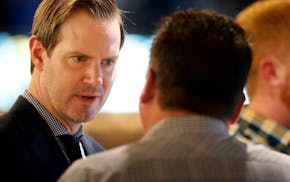The news that a general manager of a team that finished 63-99 had been fired would not have been a shock in most major league cities. It was in Minneapolis last Nov. 7, when the Twins called a news conference to announce that Bill Smith was out as GM and replaced by Terry Ryan.
Carl Pohlad had completed his purchase of the Twins from Calvin Griffith in September 1984 and there was some chaos over the next couple of years. Once Pohlad put his baseball operation together after the 1986 season, the bywords with the Twins became "stability" and "loyalty."
This lasted through World Series victories in 1987 and 1991, through eight consecutive losing seasons from 1993 to 2000, and through six division titles in the first decade of a new century.
And then the Twins fell on their collective face in 2011, and Smith was fired, and they have fallen on that face again in 2012, and the changes that are forthcoming with coaches and others will come as a surprise to no one.
Carl's sons, Jim, Bob and Bill, are now the Twins owners. This is a popular complaint from the disenchanted fan base: The Pohlads don't have a proper concern over the product because of all the money that's being made at Target Field.
That is the opposite of the truth. The reason that Jim Pohlad and his brothers can't allow the ship to stay under water as long as it did in the '90s is because of the overhead faced in the team's new digs.
Basically, the Twins could lose endlessly without great financial suffering in the '90s. The owners lost the strike of 1994-95, but it did result in Commissioner Bud Selig's determination to bring meaningful revenue sharing to baseball.
The Twins were beneficiaries with low attendance and few money-making amenities inside the Dome. The Metropolitan Stadium Facilities Commission paid for the operation of the Dome, with the Twins on the hook for little more than clean-up charges. There was no rent. The Minneapolis entertainment tax was rebated back to the team in the final indoor years.
The Twins could run a Mom-and-Pop operation that, financially, carried low risk and low reward. The Pohlads dreamed of the new yard, as have the owners of big-league teams in all sports over the past two decades, and finally it became a reality with the opening of what might be North America's best ballpark in 2010.
It's not all gravy, though. Consider:
• The Twins had become accustomed to revenue-sharing checks for $20 million in the Metrodome. This year, the Twins will be a payer of $12 million into revenue sharing.
• The Twins pay for the operation of Target Field. The expense for that will be $16 million in 2012, compared to a contribution of $1 million or so in the Dome.
• The Twins' annual debt service for their share of Target Field financing is $15 million. It was considerably less than that for the loan Carl Pohlad carried on the team when operating in the Metrodome.
• The Twins are paying annual rent of approximately $1 million to the Minnesota Baseball Authority. No big deal, but it's a million more than they were paying indoors.
• The Twins are paying the Minneapolis entertainment tax in Target Field. That gave $4.8 million to the city in 2010, $4.4 million in 2011 and an estimated $4 million for 2012. That's a windfall for the city, which as a public entity contributed nothing to the ballpark's financing.
Let's estimate: There's a $32 million difference between receiving and paying revenue sharing, $15 million in stadium operations, $8 million in debt service, $1 million in rent and $4 million in the Minneapolis tax as an increased "nut" for the Twins in Target Field.
That adds to an extra $60 million -- and we're not mentioning past improvements or new ones the Twins will make to the ballpark, or the fact Ryan's baseball department led the majors with an investment of $16 million-plus in the amateur draft and international signings in 2012.
Bottom line: The Pohlads can no longer embrace stability and loyalty as their baseball credo. The nut to crack in Target Field is too large to sit idly as the team stays in the abyss for a similar duration as the '90s.
There will be changes. Again.
Patrick Reusse can be heard noon-4 weekdays on 1500-AM. preusse@startribune.com

Reusse: How bad are the White Sox? They made Twins look good.

Reusse's Tortured Columnist Department update: Yes, Vikings won the offseason

Reusse: Wolves need stopper for Booker? NAW, it's not a problem.

Reusse: Success on court helped Timberwolves do strong business

